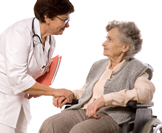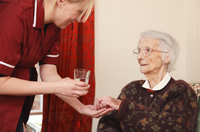Community Services

Caring for your stroke survivor can be a big task. Sometimes you need more help. There are many types of community agencies that provide services. These agencies may be for-profit or not-for-profit.

Why Are Community Services Important?
Community services can help you provide better care. The services may help your loved one feel less dependent on you. They may allow your loved one to remain at home for a longer period of time.
What Do You Need to Know?
Decide what services best meet you and your stroke survivor’s needs. Talk with your loved one and family members. Plan for the services you will need in the future. Learn about the services in your community. The VA provides many community services. Talk with a VA social worker to find services at your local VA. The costs of different services vary. Learn more about paying for community services.
How Can You Find Community Services?
The Resources section has the contact information for many of the following resources.
- Ask a social worker. Social workers at your local VA or at other hospitals and home health agencies can help.
- Look in your local telephone book for a “Guide to Human Services” or a similar title. Most have a section that lists community agencies.
- Call your local Area Agency on Aging (AAA).
- Contact other agencies like the United Way or Catholic Charities.
- Talk with other people like clergy or staff at your local senior center. The phone book will have the number for your local senior center.
- Contact a case manager or a geriatric care manager.
What Are Case Managers and Geriatric Care Managers?
Case Manager
A case manager can help you find the right services. A case manager visits your home and determines you and your loved one’s needs. They will assess your loved one’s eligibility for services. The case manager will link you to local services. The case manager will help find resources to pay for services. They will make sure the services you receive are good.
Contact your local VA social worker about case management services. VA case management services are free for most Veterans. Your local Area Agency on Aging (AAA) can also help you find a case manager. Services from a case manager through the AAA may be free or at a reduced cost.
Geriatric Care Manager
Professional geriatric care managers provide case management services. These professionals are experts in finding services for older adults. They are paid for by the family or the stroke survivor. The Resources section has contact information for the National Association of Professional Geriatric Care Managers.
What Services Can You Get for Your Loved One at Home?
Home Health Services
Home health services are provided by different types of healthcare workers. Nurses provide services, such as changing wound dressings and checking vital signs. Nursing care may include cleaning urinary catheters and giving tube feedings. Nurses may teach your loved one how to correctly take medicines. Nursing assistants may give baths or help with other personal care. Physical, occupational and speech therapists may also provide home health services.
Your stroke survivor must have a medical need to receive these services. Medicare or other insurance may pay for services if they are ordered by a healthcare provider. Otherwise, the family or stroke survivor pays for the services.
Home Care Services
Home care services are non-medical services. They include help with chores and personal care. Personal care is help with bathing, eating and other personal activities. Services may also include housekeeping, errands and home repairs. Home helpers may prepare light meals. They also provide company for your loved one.
Meal Delivery Programs
Meal delivery programs are usually known as “Meals-on-Wheels.” Workers, mainly volunteers, deliver meals to the home. A healthy, hot lunch is delivered with a cold meal for later in the day. Usually the program delivers meals five days a week. There are special diets, like diabetic and low salt diets. Your loved one may benefit from the personal contact of the person who delivers the meals. Also, some grocery stores deliver meals to the home. The Resources section has contact information for Meals-on-Wheels Association of America.
Respite Care
Respite care can be provided in the home. Workers come and stay with the stroke survivor. This gives the caregiver time to do activities outside the home. Some places, such as nursing homes, also have respite care. Learn more about respite care.
What Services Are Available in Settings Outside of the Home?
Adult Day Care
Adult day care is for persons with health or memory problems. The services vary. Adult day care centers may offer personal care. Personal care can be help with eating and personal hygiene. Day care centers may provide nursing care, such as taking blood pressures. These centers often provide meals, exercise and social activities. Some centers offer occupational, speech and physical therapies. Others have recreation activities, such as arts, crafts and music.
Day care can help you and your loved one. Your loved one can do fun activities. They can enjoy the company of other people. Day care can give you a break. It can help you keep working outside the home.
Senior Centers
Senior centers are places that often provide meals and health and wellness programs. They may have recreation, arts and social activities. They often have information about other community services.
Congregate Meal Programs
Congregate meal programs are offered in places such as senior centers. Older people are served healthy meals. Your loved one can go there and meet other people.
What Are Other Types of Services?
Medical Alarm Systems
Medical alarm systems help seniors call for emergency help from their homes. With a simple push of a button, help is available 24 hours a day. These systems will give you peace of mind that your loved one is safe. Buy these systems at your pharmacy or check on the Internet.
Transportation Services
Transportation services take your loved one to medical appointments and other places. Check with your VA social worker or your local Area Agency on Aging. Local service clubs, like the Disabled American Veterans (DAV), sometimes have transportation programs. They also may have volunteer drivers. The Resources section has contact information for these services.
Helpful Tips
- Begin planning services before your stroke survivor comes home. There may be waiting lists for services.
- Get references if using a home helper who is not employed by an agency.
- Contact a social worker or case manager about how to pay for services. Some services may be free. You may be able to pay a reduced cost for some services.
Remember
- Community services can help both your loved one and you.
- You can choose from many different kinds of community services.
- Your VA social worker and local Area Agency on Aging are good sources of information for community services.
Other Resources 
Additional credible resources on this topic can be found here. Website pages may change or update, therefore if a link does not work, you may also try to type the information into your internet search bar. This Resource List will be updated frequently.
|
*Link Disclaimer: Links to information and Web sites outside of the Department of Veterans Affairs do not indicate an endorsement of products or services offered by the sites. In addition, these sites may have privacy and security policies that are inconsistent with those of VA. |
References: Houts, P.S. (Ed.). (2004). ElderCare At Home. (2nd Ed.). New York, NY: The AGS Foundation for Health in Aging; Caring.com. (2008). How Much Care Will Your Parent Need After a Stroke? Retrieved on October 27, 2008, from: http://www.caring.com/articles/after-stroke-care (This resource is no longer available.); National Stroke Association. (2006). Let’s Talk About the Stroke Family Caregiver. Retrieved July 2008, from: http://www.stroke.org/*; Caring Connections. (n.d.). Community Resources. Retrieved on June 4, 2008, from: http://www.caringinfo.org/Community.htm (This resource is no longer available.); The National Black Catholic Congress. (2003). Face the Facts: Topics to Discuss Now with Your Aging Parents. Retrieved on November 15, 2008, from: http://www.nbccongress.org/lifestyle/aging_parents_01.asp (This resource is no longer available.)
These materials were created for the project:
Web-Based Informational Materials for Caregivers of Veterans Post-Stroke
Project Number SDP 06-327 funded by VA HSR&D Quality Enhancement Research Initiative (QUERI)



















